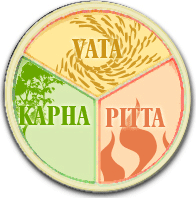DIET

Categories in DietHydration / ElectrolytesDiet TemperatureMicronutrient DiversityMacronutrientsDietEating HabitsIntroductionDiet is the foundation of overall health in Ayurveda. What you eat affects every system, organ, tissue, and cell in the body. When you eat a diet that is right for you, and you digest it efficiently, you build strong blood that goes on to nourish vital organs. The Ayurvedic diet is not a one size fits all model. It provides a highly personalized approach by using it's unique framework of the three bodily doshas and the gunas. Diet is used as a preventative measure to fight disease before it forms, and support whole body health. By following an Ayurvedic diet, you can experience vitality and strength, both physically and emotionally.The Ayurvedic Approach & AnatomyIn Ayurveda, the food you eat goes on a digestive journey through the food management channel (anna vaha srotas). This starts at the mouth where saliva and digestive enzymes (bodhaka kapha) start to breakdown the food. Here, the tongue experiences the medicinal qualities of taste. The food passes through the stomach where further digestion takes place due to churning (samana vayu), digestive enzymes (pachaka pitta) and liquid secretions (kledaka kapha). The next stage of the journey moves into the small intestines where the digestion of fat begins with the release of bile (ranjaka pitta) and pancreatic juices (kloma agni). Proteins continue to be digested (pachaka pitta) and absorption of nutrients begin (samana vayu). Food then moves into the colon (samana vayu and apana vayu) where the final stage of absorption of nutrients take place. Waste is separated from usable foodstuff and excreted (apana vayu). The final stage of absorption that occurs in the colon absorbs the refined food essence (ahara rasa). This goes on to nourish the plasma (rasa) and blood (rakta) which, in turn, nourish the rest of the body. Through this pathway of food, the significance of diet is clear. What you eat impacts your whole body.Ayurveda has it's own unique approach to diet. It promotes self awareness and learning how to eat for your constitution. It offers a tailor made system, taking the tastes (sweet, sour, salty, pungent, bitter and astringent) and qualities of food into account that are most appropriate for your body type and specific imbalances. Ayurveda also encourages establishing a solid routine for grocery shopping, cooking and mealtimes to reduce the likelihood of improper eating habits. Your appetite plays an important role in your dietary choices. One of the most important aspects of managing your appetite is learning to distinguish between true and false hunger. True hunger is when your body has a genuine need for nutrition, detected by rumbling in the stomach and other physical indicators like weakness and fatigue. False hunger is the desire to eat when you're body doesn't actually need food. This false hunger can be fueled by perverted cravings, stress, boredom, low energy or the desire to seek some sort of emotional comfort from food. Causes & Types of Diet ImbalancesA modern lifestyle presents many obstacles to following a balanced diet. Ayurveda offers practical solutions to these everyday disruptions. Between the stress of work, time pressure, or lack of access to healthy foods, your diet may suffer. However, with a little careful planning, you can combat the negative effects of eating on the run by learning to eat more mindfully, manage portion control, and balance your weight. With a wealth of nutrition information available online, it can be hard to know if you are making the right food choices. Ayurveda provides a clear roadmap for you to make moment to moment choices, even in trickier situations like social occasions and eating out in a restaurant.A weak appetite can stem from a variety of sources, both physical and psychological, and can lead to improper eating habits, low energy and digestive toxins (ama). If you don't have much practice in the kitchen, it can be intimidating to try create new recipes and lead you to fast food alternatives. These convenient options not only take a toll on weight, but also overall health, digestive strength, energy, mood, and emotions. Ayurveda promotes engaging in the cooking experience. Diet by DoshaAyurveda has the unique advantage of creating personalized diets according to an individual's needs, and what foods your particular body thrives on. A Vata balancing diet encourages lots of warm, moist, grounding and easy to digest foods to stabilize an often frantic or anxious person. A Pitta balancing diet incorporates meals based on sweet, cooling and soothing foods to reduce excess heat and balance digestion. A Kapha balancing diet promotes the inclusion of light, pungent and warm foods to balance a body type that tends to be heavier. Ayurveda opens a whole avenue to greater health through diet - it is colorful, flavorsome and creative. By eating a healthy diet that's ideal for your body, you can experience optimal health.HOW AYURVEDA WORKSARE YOU WONDERING HOW AYURVEDA CAN HELP YOU?WHY IS AYURVEDA THE RIGHT SOLUTION?Ayurveda strengthens the body while opposing disorders. It takes a holistic, systemic approach that looks at the whole body. Ayurveda shows how to interpret signs and symptoms of imbalance, and how to address them using diet, lifestyle adjustments, and herbs. It shows a person how to optimize their health on a continual basis. You can't take the doctor home with you, but you can take Ayurveda home with you. Ayurveda is the most advanced and easy to use home system for self healing.HOW DOES AYURVEDA WORK?Ayurveda starts by identifying your body type, which identifies certain tendencies in your body to get sick (as well as identifying your strengths). It uses body type to determine the likely root causes of your disorders. Next, Ayurveda analyzes the nature of your disorder. It fits all your signs and symptoms into a pattern, expressed as a combination of biocharaceristics (gunas). For example, you may have a heat disorder, a cold disorder, or an oily disorder, etc. This simple categorical approach shows you how to correct systemic imbalances and strengthen your body as a whole.On Joyful Belly, we've created an extensive categorization of food so you can easily match food to your imbalanced biocharacteristics. By eating an optimal diet that balances your biocharacteristics, your whole body is strengthened and the conditions that created the disorder are removed. Once the root causes of the disease are removed, the disease lessens in strength or disappears altogether. Additional remedies - such as herbs and lifestyle practices - focused on the specific disorder, can greatly enhance your healing. GET STARTEDTo get started on your Ayurvedic journey, we first recommend that your find your body type by taking our free quiz. In Ayurveda, every solution is based on your unique body type, so by taking this quiz, you’ll get the best results. |
Join Joyful Belly.
Want our top Ayurvedic recipes and health tips?Subscribe to our free newsletter!






